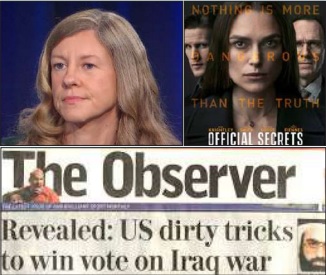Movie Review: Official Secrets, IFC Films, 2019
On the morning of 31 January 2003, a British analyst working at the UK’s signals intelligence agency, Government Communication Headquarters (GCHQ), was startled by a classified directive landing in her email inbox from the US National Security Agency, ordering a “surge” of GCHQ spying activity directed at UN Security Council member nations to push them into supporting a UNSC vote for war against Iraq. The memo proposed monitoring calls and emails for collection of information that would provide insights into how nations might vote at the UNSC and to look for “the whole gamut of information that could give US policymakers an edge in obtaining results favourable to US goals or to head off surprises”. In other words, to gather intelligence that could be used for “either blackmailing them, or bribing them, or threatening them”, as GCHQ whistleblower Katharine Gun told Salon in a 24 August 2019 interview.
The 2019 British film Official Secrets, directed by Gavin Hood and starring Keira Knightley as Katharine Gun, tells this very important story. Gun felt sick to her stomach after receiving the email, which was right before US Secretary of State Colin Powell’s 5 February speech claiming proof that Iraqi dictator Saddam Hussein had weapons of mass destruction and links to al-Qaeda, but which left UNSC members including France, Russia, China, and Germany unconvinced. It also preceded the 14 February release by UN chief weapons inspector Hans Blix’s interim report which challenged Powell’s assessment, showing that Iraq was actually in compliance with the relevant UN resolutions. The email came in on Friday. With war propaganda reaching extreme heights, by Monday Gun had decided she had to get it out to the public. “I really felt that time was absolutely pressing, that there was no time to take it up to any of my superiors.” She printed out the memo and posted it to a contact who promised to pass it on to a wellknown anti-war activist.
By 15 February, a couple of weeks later, one million people including Gun protested in London, and many more worldwide. It was nearly a month later that the leaked memo was published, featuring on the front page of the 2 March 2003 Observer newspaper (now part of the Guardian). Although her name was not yet connected in any way, Gun was terrified. When GCHQ started interrogating all staff who received the emailed, one by one, she quickly confessed she was the leaker. She was arrested, held overnight, her house searched, and eventually after several months in limbo, charged under the Official Secrets Act 1989, which protects secret government information. She endured ongoing harassment up until the trial, aimed at psychologically breaking her, including an effort to deport her Turkish husband.
Despite everything, the war went ahead, beginning 19 March. Speaking to media on the day of her trial, Gun said, “I’m just baffled in the 21st century we as human beings are still dropping bombs on each other as a means to resolve issues.”
While there is no traditional defence for breaching the Secrets Act, Gun insisted on pleading not-guilty on principle, even though it would likely send her to jail, whereas pleading guilty would assure a light sentence. With the help of Liberty lawyers Ben Emmerson and Shami Chakrabarti (who in 2016 was appointed to the House of Lords by the Labour leader Jeremy Corbyn) she came up with a unique defence: As it was an illegal war, Gun was acting out of loyalty to her country by acting to prevent its involvement. This may or may not have held water, but Gun’s legal team got wind of the fact that British Attorney General Peter Goldsmith, who had initially held that the war was illegal, changed his position after travelling to the USA to meet with members of the Bush Administration who were gunning for war. Knowing this, when the trial eventually rolled around the prosecution dropped the case within half an hour of court commencing—only because the Blair government was desperate to prevent the full story of how they shaped advice to justify war emerging through a public trial.
To prove Gun wrong, the prosecution would have had to expose evidence that incriminated the government, including the legal advice provided by Goldsmith on the legality of the war. Director of Public Prosecutions Ken McDonald has since claimed the case was dropped because Gun could not have received a fair trial without disclosing more classified information, but after three years of extensive research Official Secrets movie director, Gavin Hood, was not satisfied and demanded the declassification of all relevant documents.
Gun insists she would do it again. In 2006 with a new war against Iran brewing, Gun published an article at TomPaine.com urging would-be whistleblowers “to disclose information which relates to this planned aggression”. Given the truth that has emerged about the real situation regarding WMD in Iraq, she wrote, “Don’t let ‘the intelligence and the facts be fixed around the policy’ this time”.
Gun’s whistleblowing in 2003 followed interventions by NSA whistleblowers Bill Binney and Thomas Drake exposing the post-9/11 mass collection of data, but preceded by up to a decade better known interventions by WikiLeaks founder Julian Assange in 2010 and NSA-CIA analyst Edward Snowden in 2013. This courageous woman, who acted simply because it was the right thing to do, deserves similar recognition.
This movie can be rented on Youtube.
By Elisa Barwick, Australian Alert Service, 24 March 2021







